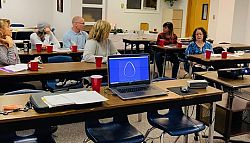Through technology, new catechists certified, help strengthen the faith in Utah

SALT LAKE CITY – While the coronavirus has negatively impacted society at large, the pandemic has led to innovation among organizations trying to continue to function during these difficult times. In the Diocese of Salt Lake City, pastors have learned how to livestream Masses and other ways to care electronically for their flocks, while religious educators have embraced Zoom, a videoconferencing application. A silver lining in all of this is that with these electronic services, Catholics in the outlying areas of the diocese have had the same access to this instruction as their peers along the Wasatch Front, without having to travel long distances.
As an example, most of the diocese’s eight new catechists recently completed their certification, and five other catechists recertified, by using Zoom. It was an easy transition because last fall diocesan formator Nelda Troyer began offering in-person classes twice a month at the Pastoral Center, and alternated these with Zoom classes.
“Nelda really was an innovator in doing this,” said Susan Northway, director of the diocesan Office of Faith Formation. “In-person instruction is hard for people [who must] coming from all over the city and surrounding areas; she solved the problem by going online.”
Since the pandemic restrictions have been implemented, the catechist classes have gone completely online. The format has been well-received by participants, Troyer said. The training includes classes in theology and teaching methods. Participants share their goals, ideas and testimonies as they work through the material together.
“I believe the catechist training is very beneficial for someone that has the call or discernment to teach religious education but is worried about not having the experience or knowledge of teaching,” Troyer said.
Generally, catechists are required to have 48 hours of classroom training to be certified. During the pandemic the diocese is working in different ways with candidates to help achieve this. Northway said there are several routes to certification. For example, some directors of religious education are investigating an online Loyola Press catechist training, which may be an option for those unable to make a regularly scheduled Zoom training. Other options are also available, she said.
“We have to be flexible on this; this is such an extraordinary time,” Northway said. “I think people are doing the best they can. We’re just trying to be practical and pastoral about that requirement.”
Northway said there is a great need for certified catechists in the diocese.
“They are witnesses in the marketplace,” she said. “The way in which they love, their kindness towards others, their love of people and their desire to serve will surface. That community is a witness without words sometimes. So having a group of dynamic, committed people teaching the faith attracts others, perhaps those who never grew up with a faith, to investigate more for themselves.”
Troyer is beginning a new online certification program on Nov. 12. The classes, which are expected to finish in April, will run on Thursdays from 6:30 p.m. to 8 p.m. Those who are interested in being trained as a catechist should contact their parish’s director of education.
© Copyright 2025 The Diocese of Salt Lake City. All rights reserved.

Stay Connected With Us